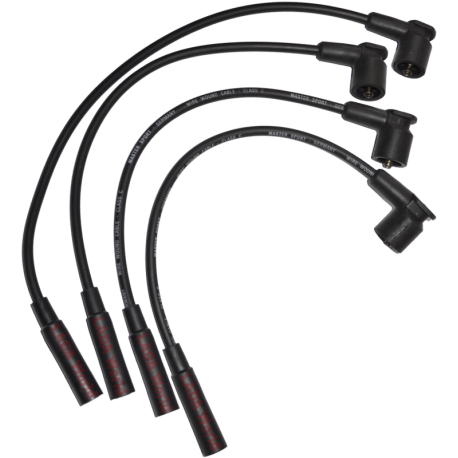
ignition leads/spark plug leads replacement play a pivotal role in the operation of a petrol internal combustion engine, serving as a vital component.
Their primary function is to ignite the air and fuel mixture within the engine’s cylinders.
The ignition system is responsible for supplying voltage to the ignition leads/spark plug leads at precise intervals, a process controlled either by the Engine Control Unit or an Ignition module.
As with many parts, ignition leads/spark plug leads experience wear and tear over time, prompting most manufacturers to specify replacement intervals based on distance travelled and elapsed time.
Failure to replace worn ignition leads/spark plug leads can result in difficulties igniting the air-fuel mixture, leading to engine misfires and increased fuel consumption.
In most engines, there is a ignition lead/spark plug lead assigned to each cylinder, though some manufacturers opt for two ignition leads/spark plug leads per cylinder.
In certain vehicles, accessing the ignition leads/spark plug leads necessitates the removal of the intake manifold.
The average cost for ignition leads/spark plug leads replacement typically ranges from $150 to over $300, contingent upon factors such as the type of ignition leads/spark plug leads and whether additional components, like the inlet manifold, must be disassembled for access.
ignition leads/spark plug leads are crucial components in internal combustion engines, especially those powered by gasoline (petrol). They are small, yet essential parts located at the top of each cylinder in the engine block. Their primary function is to ignite the air-fuel mixture inside the combustion chamber of the engine.
ignition leads/spark plug leads consists of a metal shell, an insulator, a central electrode, and a ground electrode. When the electrical voltage supplied by the ignition system reaches the gap between the central electrode and the ground electrode, it creates a spark. This spark ignites the compressed air-fuel mixture in the combustion chamber, initiating the combustion process that drives the engine.
ignition leads/spark plug leads are designed to withstand high temperatures and pressures inside the combustion chamber. However, over time, they can become aging, leading to decreased performance, misfires, and increased fuel consumption. Therefore, regular inspection and replacement of spark plugs are essential for maintaining optimal engine performance and fuel efficiency.
- Difficulty Starting: Worn or fouled ignition leads/spark plug leads may make it challenging for the engine to start, leading to prolonged cranking or multiple attempts before the engine fires up./li>
- Rough Idling: If your engine idles roughly or inconsistently, it could be a sign of worn ignition leads/spark plug leads. Misfires caused by faulty spark plugs can cause the engine to shake or vibrate at idle.
- Poor Acceleration: Worn ignition leads/spark plug leads can result in sluggish acceleration and reduced engine power. This is because they may fail to ignite the air-fuel mixture efficiently, leading to a decrease in engine performance.
- Poor Engine Misfires: One of the most common signs of worn ignition leads/spark plug leads is engine misfires, which manifest as sudden, brief interruptions in engine power. Misfires can be felt as jerking or hesitation during acceleration.
- Reduced Fuel Efficiency: Faulty ignition leads/spark plug leads can lead to incomplete combustion, resulting in increased fuel consumption. If you notice a significant drop in fuel efficiency, worn spark plugs could be a contributing factor.
- Engine Stalling: In severe cases, worn ignition leads/spark plug leads can cause the engine to stall unexpectedly, particularly when idling or during low-speed driving.
- Engine Knocking or Pinging: Improperly functioning spark plugs may cause abnormal combustion, leading to engine knocking or pinging noises. This can indicate that the spark plugs are not igniting the air-fuel mixture at the correct time or with sufficient intensity.




